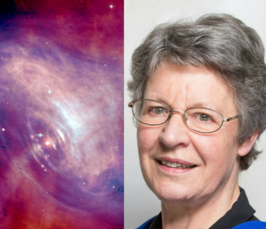Special colloquium talk by Jocelyn Bell Burnell: What is that? The discovery of pulsars - a graduate student's story
Special Colloquium
- Date: Dec 12, 2018
- Time: 02:00 PM - 03:30 PM (Local Time Germany)
- Location: Main building Max Planck Campus Potsdam-Golm
- Room: large lecture hall

As a graduate student at the University of Cambridge, Jocelyn Bell Burnell made fundamental contributions to the discovery of the first radio pulsars in 1967. In 1974, the discovery was recognized by the award of the Nobel Prize in Physics for her thesis supervisor, Antony Hewish, and the astronomer Martin Ryle. This was the first time the prize was awarded for work in astronomy.
In the course of her career, Jocelyn Bell Burnell investigated high-energy astrophysical phenomena, such as neutron stars and binary stellar systems, by conducting observations at a wide range of electromagnetic wavelengths, from radio- to gamma-ray signals. She held positions at the University of Southampton, University College London, the Royal Observatory, Edinburgh and the University of Bath, and is currently Visiting Professor of Astrophysics at Oxford University.
Jocelyn Bell Burnell was awarded numerous prizes -- most recently she received the Special Breakthrough Prize in Fundamental Physics in 2018. The award committee cites her “detection of radio signals from rapidly spinning, super-dense neutron stars” as well as her “lifetime of inspiring scientific leadership.” Bell Burnell donated the $3 million prize money to the Institute of Physics to fund PhD fellowships for underrepresented minorities in physics.
In 1999, Bell Burnell was appointed Commander of the Order of the British Empire for services to astronomy, and she was promoted to Dame Commander of the Order of the British Empire in 2007.
She served as president of the Royal Astronomical Society from 2002 to 2004, and as president of the Institute of Physics from 2008 until 2010 and in early 2011.